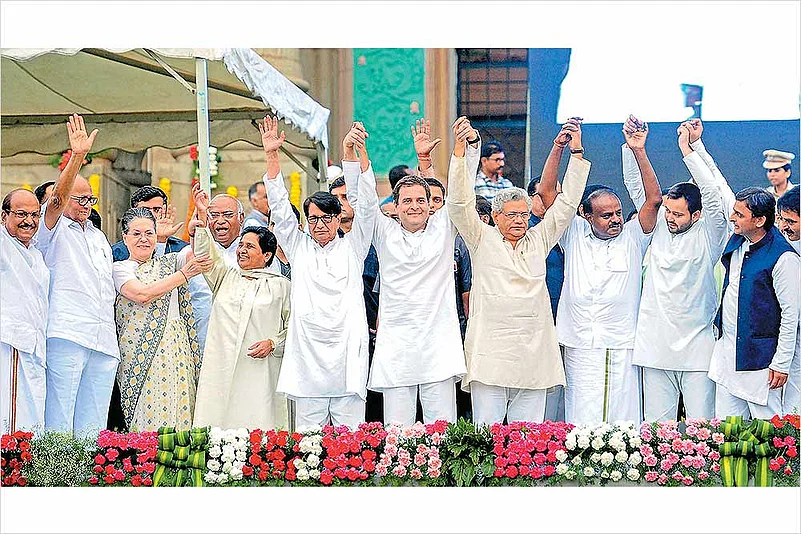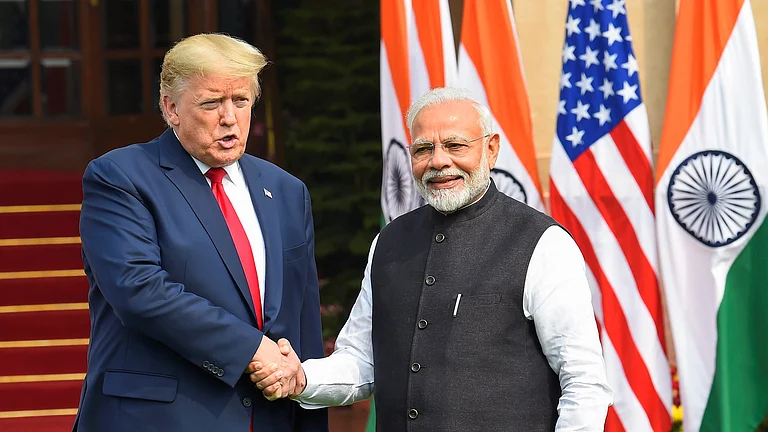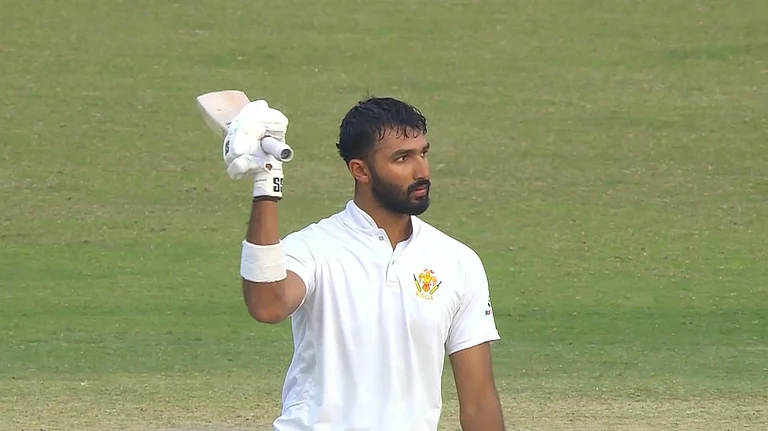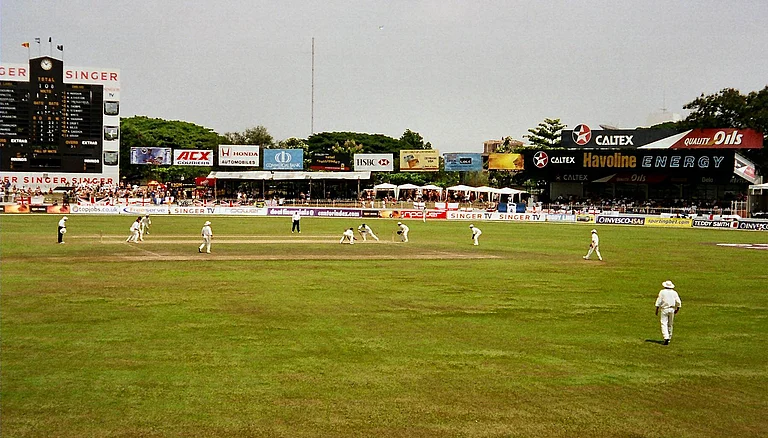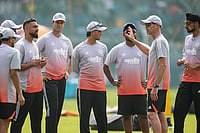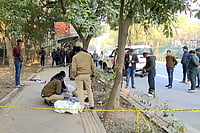At the end of a long week in politics, you couldn’t miss some patterns—none of the three times BJP leader B.S. Yeddyurappa became chief minister of Karnataka had been a cakewalk for him. So it has been with his nemesis too, H.D. Kumaraswamy who is now the state’s new ruler. And, after the seven-day political scramble in the wake of a split poll verdict in the state came a star-studded swearing-in ceremony that is raising opposition hopes for the big Lok Sabha battle next summer.
Not since 1988, when various Janata Parivar leaders came together to form the Janata Dal has there been a similar plank in Bangalore, says a senior Congressman. Nor is the timing any less significant: the Modi government steps into its fifth year this week. The political heft at Kumaraswamy’s inauguration—Sonia Gandhi, Mamata Banerjee, N. Chandrababu Naidu, Sharad Pawar, Mayawati, Akhilesh Yadav, Tejashwi Yadav, Sitaram Yechury, Pinarayi Vijayan, Arvind Kejriwal, Ajit Singh—was obvious enough. Yet, like 30 years ago, when Janata leaders grouped together against the then ruling Rajiv Gandhi regime at the Centre, will the anti-BJP rapport being fostered now have a definite bearing on the general elections next year?
“It gives a message that we can fight (Prime Minister Narendra) Modi and (BJP president) Amit Shah,” says the Congress leader. It’s too early to make calculations, though, according to others. “There are parties with different views here,” says a Janata Dal (Secular) leader. “The Marxists have come to the swearing-in, so has Mamata. But they have to fight themselves in West Bengal. The Congress and CPI(M) too have to fight. But you could say these people are well-wishers of the Congress and JD(S).”
Notes Kumaraswamy, “In 2019, there will be a major change in the country’s political situation. That’s why they assembled here.” Shah, meanwhile, brushes aside the suggestion of an opposition gathbandhan. “All these people were anyway fighting us in 2014 in their own states. There’s nothing new about it,” he told reporters at a press conference earlier in the week.
Even so, as the Karnataka election outcome provided the stage for regional leaders to come together, the immediate question many were asking was a bit more local: will the JD(S)-Congress in Karnataka be a lasting relationship?

H.D. Kumaraswamy (left) taking oath as the CM, on May 23
The JD(S), with 37 seats (including a Bahujan Samaj Party MLA), is in the driver’s seat, unlike its previous coalition government with the Congress in 2006. Still, the Congress—as the larger party with 78 MLAs—will get more ministerial berths (22 as against the JD-S 12). Besides, Karnataka Pradesh Congress Committee president G. Parameshwara is deputy CM—he’s the first Dalit leader to be appointed to the post—and so is the Speaker a Congressman. Of course, over the last week, the two parties displayed unusual camaraderie as they jointly fought the BJP which was making a desperate bid to wrest power despite not having enough numbers.
Here’s a recap of the high drama: Yeddyurappa took oath as Karnataka CM on May 17 just hours after a Supreme Court bench sat through the night hearing the JD(S)-Congress petition challenging the Governor’s decision to invite 75-year-old Yeddyurappa to form government and a ‘generous’ offer of 15 days’ time to prove he had the majority. Together, they had 117 MLAs, comfortably over the halfway mark of 111 while the BJP had only 104. But on May 18, the Supreme Court cut short the 15-day interval and gave Yeddyurappa 24 hours for a trust vote. That, after a nail-biting assembly session the next day, never happened. Yeddyurappa, for the second time in his career, resigned as CM because his saffron party didn’t have the numbers.
The episodes accompanying all this were perhaps even more scandalous than Karnataka’s previous political thrillers. The Congress, even as it dashed its legislators from Bangalore to Hyderabad in buses to prevent defection, released audio recordings of BJP leaders allegedly making offers to some of its MLAs on phone, charges which the BJP has denied. “If they disprove it, I will not be in public life for a minute. That challenge I have given to them (BJP),” says V.S. Ugrappa, the Congress spokesman who had released the recordings just ahead of the trust vote on Saturday. Even then, matters only fell into place when two ‘missing’ legislators, Anand Singh and Pratapgouda Patil—they were rumoured to be in Delhi—appeared at Vidhana Soudha, the state secretariat, effectively ending the game.
The image that stood out, after Yeddyurappa resigned without taking the vote of confidence was of Congress leader D.K. Shivakumar and Kumaraswamy (both Vokkaligas, whose rivalry goes back a couple of decades) clasping hands in victory. Shivakumar, who last year famously helped party senior Ahmed Patel win his Rajya Sabha election in Gujarat by ‘protecting’ party MLAs, is the Congress’ main troubleshooter and among Karnataka’s richest legislators.
“What is the Congress celebrating? They have found a new way to create victory out of defeat,” said Shah at his press conference, calling the coalition an “unholy alliance”. Karnataka BJP leaders kept away from Kumaraswamy’s swearing-in ceremony, and BSY said the government won’t last three months.
There’s little doubt the new government will face tricky situations—beginning with the elections to two constituencies in Bangalore city, where polls had been postponed. Then, the effect the union will have on grassroots workers of both parties who are fierce rivals in many southern Karnataka districts. “There isn’t much of an option for the workers,” admits a Congress leader.
Back in 2004, when there was a hung assembly, the two parties had formed a coalition government with the late Dharam Singh (Congress) as CM and Siddaramaiah as his JD(S) deputy but it lasted only 20 months because Kumaraswamy pulled away to form government with the BJP. He now wants to erase that chapter. “We will prove that a coalition can work well,” Kumaraswamy told reporters at his May 23 press meet after taking charge as the CM. “Don’t worry about this government’s stability. There will be issues but we will solve them,” he said. The new CM’s priority is the poll-time promise of a farm loan-waiver for which a blueprint, he says, is ready.
“The challenges are plenty. It is not a smooth-sailing affair, both parties know that,” veteran JD(S) leader P.G.R. Sindhia tells Outlook. “But sometimes necessity becomes the mother of invention. This is the necessity of the time,” he says.
By Ajay Sukumaran in Bangalore






